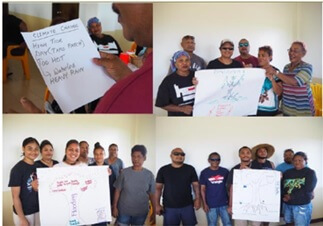Related News

As the climate continued to shift, bringing about more frequent heatwaves, prolonged La Niña effects, rising sea levels, and saltwater intrusion in the region, the leaders of Ngardmau State, in Palau cooperatively developed a strategic plan to guide their community’s adaptation to these challenges.
While it remains difficult for Pacific Small Island States to access the Green Climate Fund, The University of the South Pacific, through European Union funding, supported Palau in developing the Ngardmau State Adaptation Plan.
This visionary initiative was successfully brought to life through the USP-European Union-funded Global Climate Change Alliance Plus Scaling Up Adaptation (EU GCCA+SUPA) project, a comprehensive effort that assists 10 Pacific Small Island States, encompassing the governments and populations of the Cook Islands, Federated States of Micronesia (FSM), Fiji, Kiribati, Marshall Islands, Nauru, Niue, Palau, Tonga, and Tuvalu.
A total of 15 million euros was allocated for this vital mission from 2019 to 2023.
With the last development plan for Ngardmau State dating back to 2016, nearly seven years had passed without a clear roadmap for resilient development, exacerbated by the exodus of skilled citizens to the United States and other countries.
The EU GCCA+SUPA project partnered with the Palau sub-national government and the Ngardmau community’s dedicated leaders, led by the Office of Climate Change under the President’s Office, to create what is now known as the “Working Document.”
This plan resulted from a participatory process, engaging change agents propelling climate initiatives in the community, private sector, and government agencies, notably with a strong representation of women.
This approach has empowered women to play a pivotal role in fostering resilient agriculture and sustainable fisheries, key traditional activities in Ngardmau State.
President of Palau, Mr Surangel Whipps Jr, emphasized the significance of community-driven adaptation initiatives as well as the core responsibilities of the nation for safeguarding its natural environment and cultural heritage, offering an integrated solution to the multifaceted challenges posed by climate change.
The commitment to the GCCA+SUPA project’s sustainability has been adopted by the Climate Change Division, with the President taking a leading role in embedding project activities into Palau’s future development plans.
The GCCA+SUPA Programme-USP Component remains dedicated to enhancing the resilience-building capacity of local stakeholders, with a primary focus on sub-national entities, including state, provincial, and local island governments.
This four-and-a-half-year project (2019-2023), funded with €15 million from the European Union (EU), is executed by The Pacific Community (SPC) in partnership with the Secretariat of the Pacific Regional Environment Programme (SPREP) and the University of the South Pacific (USP).
It is a collaborative effort involving the governments and people of the Cook Islands, Federated States of Micronesia (FSM), Fiji, Kiribati, Marshall Islands, Nauru, Niue, Palau, Tonga, and Tuvalu.